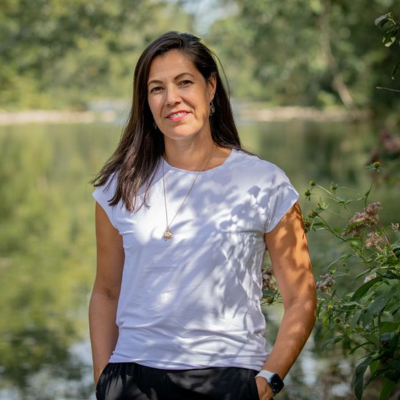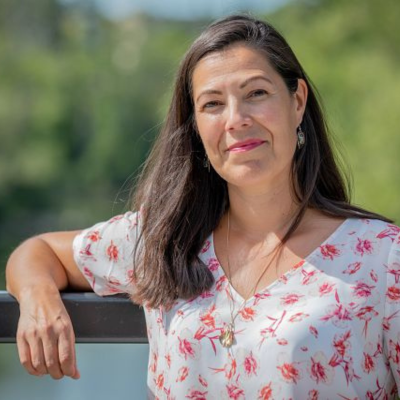News and Updates
Contact
Faculty of Social Science
Social Science Centre
Room 9438
Western University
T. 519-661-2053
F. 519-661-3868
E. social-science@uwo.ca
Breaking Barriers: Chantelle Richmond’s Journey to Full Professorship
September 13, 2024By Diana Corredor In the heart of Western University, Professor Dr. Chantelle Richmond stands as a beacon of progress and resilience. As a Canada Research Chair in the Department of Geography and Environment and the Indigenous Studies Program, and Co-chair of the Indigenous Faculty Advisory Council, she has dedicated her career to Indigenous Peoples health and their relationship with their local environments. Alongside Professor Dr. Lina Sunseri, Richmond has made history by becoming one of the first Indigenous full professors at Western University, a landmark achievement that took effect on July 1st. This moment not only marks a personal milestone for both scholars but also signifies a pivotal moment for the university and the wider community.
In the heart of Western University, Professor Dr. Chantelle Richmond stands as a beacon of progress and resilience. As a Canada Research Chair in the Department of Geography and Environment and the Indigenous Studies Program, and Co-chair of the Indigenous Faculty Advisory Council, she has dedicated her career to Indigenous Peoples health and their relationship with their local environments. Alongside Professor Dr. Lina Sunseri, Richmond has made history by becoming one of the first Indigenous full professors at Western University, a landmark achievement that took effect on July 1st. This moment not only marks a personal milestone for both scholars but also signifies a pivotal moment for the university and the wider community.
Richmond’s journey to this remarkable achievement is marked by numerous accolades and pioneering initiatives. She has been instrumental in fostering a greater understanding of the socio-cultural determinants of Indigenous health, using her research to inform policies and practices that aim to improve the lives of Indigenous peoples across Canada. Her role as Co-chair of the Indigenous Faculty Advisory Council at Western further underscores her commitment to creating an inclusive and supportive environment for Indigenous scholars and students.
Raised in the small town of Marathon, Northern Ontario, Richmond’s early experiences in nature, combined with the complexities and inequities she witnessed as a native person, deeply influenced her academic journey. “Growing up as a native person in Northern Ontario,” she recalls, “I was immersed in the natural world but also faced complexities and inequities that I didn’t fully understand at the time.” These early experiences would go on to shape her research and academic pursuits, offering a unique lens through which she views the intersection of health and place.
Her academic journey took her from McGill University, where she earned her PhD in 2007, to a postdoctoral position at the University of Toronto, before joining Western University in 2008. Over the years, Richmond has witnessed a growing Indigenous presence in academia, noting, “From 1997 to 2024, the presence of native people in universities has grown, making me feel less lonely in these spaces, and a lot more hopeful.”
 Her promotion to full professor is a testament to her unwavering dedication, rigorous scholarship, and impactful contributions to both academia and Indigenous communities. Through her efforts, she has shaped a new sub-discipline: geographies of Indigenous health, which explores the profound relationship between Indigenous peoples and the land, emphasizing the importance of this connection in understanding health, wellness, and healing.
Her promotion to full professor is a testament to her unwavering dedication, rigorous scholarship, and impactful contributions to both academia and Indigenous communities. Through her efforts, she has shaped a new sub-discipline: geographies of Indigenous health, which explores the profound relationship between Indigenous peoples and the land, emphasizing the importance of this connection in understanding health, wellness, and healing.
Her groundbreaking work has garnered recognition, including a substantial $1.9 million grant in collaboration with the Southwest Ontario Aboriginal Health Access Centre (SOAHAC). Awarded by the Canadian Institutes for Health Research, this grant supports the development of sustainable and culturally relevant health interventions aimed at addressing pressing issues faced by Indigenous communities.
Richmond’s new status as one of Western’s first Indigenous full professors is a milestone that resonates deeply within the university and the broader community. Reflecting on her achievement, she expressed gratitude for the support she has received from colleagues, students, and the community. “This is not just my success,” she stated. “It is a collective achievement that honours the resilience and strength of Indigenous peoples. I am committed to continuing our journey towards greater equity and sense of belonging for Indigenous peoples in all corners of our university.”
A poignant moment in Richmond’s career came during her convocation address, where she honoured her mother by inviting her to the ceremony. This deeply emotional gesture highlighted the generational struggles and triumphs of Indigenous families in academia, and the significance of her achievements for those who came before her.
Looking ahead, Richmond remains committed to fostering a welcoming environment for Indigenous faculty and students at Western University. “We need to welcome the whole human,” she says. “It’s about respecting scholars for their humanity and the unique perspectives they bring. It’s about healing and understanding our place in the world.”
As Richmond continues her groundbreaking work, she serves not only as a scholar but also as a bridge between traditional Indigenous knowledge and modern academia. Her achievements ensure that Indigenous voices are not only heard but celebrated, paving the way for future generations of Indigenous scholars. Richmond’s journey exemplifies the transformative power of education, perseverance, and community, inspiring change and fostering a more inclusive, just society.
Photo credit: Christopher Kindratsky, Western Communications

